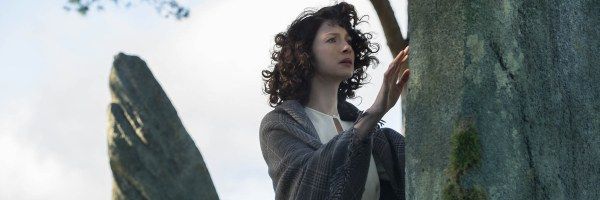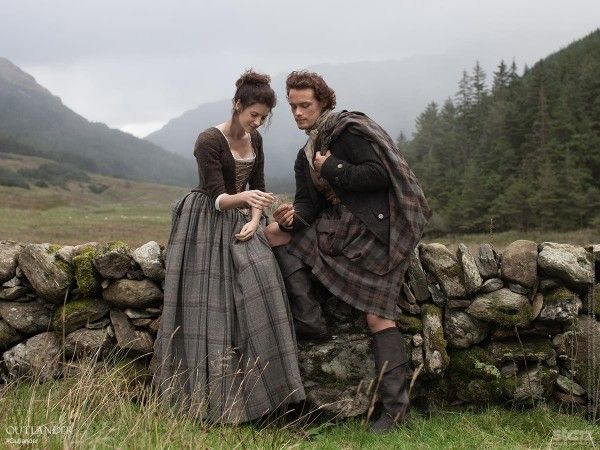Based on the novel series by Diana Gabaldon, Outlander follows a married WWII nurse, Claire Randall (Cairtriona Balfe), as she is mystically transported from 1945 to 1743. The Starz series, adapted by Ronald D. Moore (Battlestar Galactica) combines history, romance, sci-fi, and even a little realpolitik as Claire ventures from a sleepy "second honeymoon" in Inverness, Scotland, to being part of a dangerous and confusing time in a place she knows almost nothing about. Hit the jump for why, "so far I had been kidnapped, assaulted and nearly raped, and somehow I knew my journey had only just begun."
Outlander's premiere episode, which Starz has made available ahead of its official launch, spends most of its time with Claire and her husband Frank (Tobias Menzies) in 1945, on a trip to Inverness to help "rediscover" one another after nearly five years apart during the war. Frank is a historian with an interest in genealogy, and Claire is an amateur botanist who had served as a nurse; the two have a warm and easy relationship, and he meets her sexual appetites, even though he rarely initiates the interactions (the two have some beautiful love scenes together, which are not in need of a voiceover to explain their closeness -- more on that later).
As the Randalls explore the area, and Frank fills Claire in on its history, a number of strange occurrences begin to infiltrate their experience. The setting accentuates the wild beauty of the hills and vales of Inverness, brushed with rich but muted tones (all of which is augmented by Bear McCreary's gorgeous score). There are ghostly figures, dancing Druids, prophesies and something palpably mystical. The slow, dreamy scenes that define their stay though show that Outlander is in no rush to tell its story … but viewer anticipation of time travel hangs over the proceedings. When Claire finally is grabbed back into the past, though, the biggest mystery is why it took so long.
Outlander does an admirable job, for the most part, of time traveling within its own storytelling. When Claire remembers something important, or a memory helps to accentuate the emotions of a scene, the show doesn't hesitate to flow freely in the flux of time, which makes it curious why the time travel wasn't introduced more quickly, and the scenes before it introduced through flashback (like so much else is).
But Outlander's biggest error is its insistent voiceover. The strong acting and visuals do all that is needed to guide viewers to what we need to know -- there is not a clear reason why Claire needs to narrate every moment that we can clearly see (especially since Balfe is a vision as Claire, and easily displays what she needs to in terms of where she is emotionally).
By the second episode, the voiceover wanes somewhat, but its presence is still distractingly constant. There isn't a need for much more to be said than what is apparent at the time: Claire, the feisty and beautiful accidental time-traveler, has found a way to stay alive by using her skills as a healer to impress a brutish band of Scottsmen, including the brave and handsome Jamie (Sam Heughan), with whom she immediately establishes a rapport. Beautiful girl meets warrior boy, and suddenly, said girl starts to forget about her historian husband … it's not that confusing.
While Claire begins to accept the facts of her transportation, the world around her begins to develop more. There is a lot to unpack in the relationship between two brothers who lead the MacKenzie clan she has fallen in with, Dougal and Colum (Graham McTavish and Gary Lewis, respectively), as well as Jamie's complicated background. There are also many suspicions about Claire's arrival in Inverness, and whether or not she is a British spy. But aside from some light Connecticut Yankee in King Arthur's Court time-travel humor, Claire establishes herself quickly and easily thanks to her capabilities as a "healer," which gives her a certain position of power (but also shackles her in other ways).
Ronald D. Moore is no novice when it comes to adapting strong female characters, and for the most part, Claire is a tough and capable lead, whose exploits will surely be fun to follow as she navigates her new surroundings. But for those who haven't read the novel series (this reviewer included), there are still many questions after the first two, slow hours about where things are headed. And so far, no indication of how (or if) the two storylines will reconcile or connect in any way.
Though some have dismissed Outlander as primarily a female-oriented show (because of the female protagonist? Forsooth), its action sequences and rich storytelling make it a worthwhile watch for anyone with an interest in historic dramas with a hint of sci-fi. Outlander is definitely a slow simmer, though, and a 16-episode first season makes it clear that there is no hurry to tell its story; whether that leaves it enough drive and force to make it an exciting weekly watch remains to be seen. On the other hand, Outlander has a lot of potential, and features a talented cast with a great creative force behind them that will hopefully help propel it. It's biggest lesson, though, is one typically directed at novels: show, don't tell.
Outlander premieres Saturday, August 9th at 9 p.m. ET on Starz.


